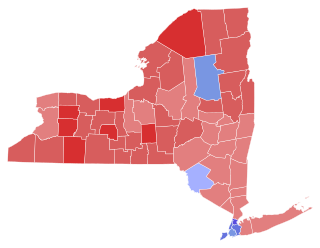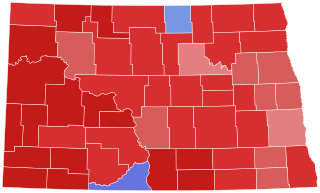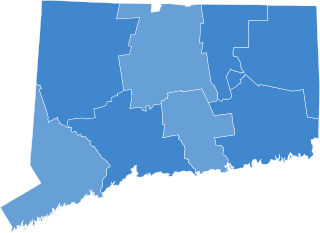
There have been 91 gubernatorial elections in the state of New York since 1777, with the most recent being held on November 8, 2022. The next election is scheduled to be held on November 3, 2026.

Albert E. Ottinger was an American lawyer and politician.

The 1874 South Carolina gubernatorial election was held on November 3, 1874, to select the governor and lieutenant governor of the state of South Carolina. Daniel Henry Chamberlain won the election and became the 76th governor of South Carolina.

The 1918 New York gubernatorial election took place on November 5, 1918, to elect the Governor and Lieutenant Governor of New York, concurrently with elections to the United States Senate in other states and elections to the United States House of Representatives and various state and local elections.

The 1920 New York gubernatorial election took place on November 2, 1920, to elect the Governor and Lieutenant Governor of New York, concurrently with elections to the United States Senate in other states and elections to the United States House of Representatives and various state and local elections.

The 1978 Texas gubernatorial election was held on November 7, 1978, to elect the governor of Texas. In a surprising upset, Republican Bill Clements was narrowly elected over Democratic State Attorney General John Luke Hill, winning 50% of the vote to Hill's 49%. In doing so, Clements became the first Republican to be elected governor since Reconstruction in 1869.

The Columbus mayoral election of 2011 was the 84th mayoral election in Columbus, Ohio. It was held on Tuesday, November 8, 2011. Incumbent mayor Michael B. Coleman defeated challenger Earl W. Smith. The scheduled nonpartisan primary was canceled because only two candidates were able to make the ballot. While the election was formally nonpartisan, Coleman was affiliated with the Democratic party while Smith was affiliated with the Republican party. Coleman was re-elected to a fourth term and became the longest-serving mayor of Columbus.

The 2014 Georgia gubernatorial election took place on November 4, 2014, to elect the governor of Georgia, concurrently with the election to Georgia's Class II U.S. Senate seat, as well as other elections to the United States Senate in other states and elections to the United States House of Representatives and various state and local elections.

The 2020 North Dakota gubernatorial election was held on November 3, 2020, to elect the governor and lieutenant governor of North Dakota, concurrently with other federal and statewide elections, including the U.S. presidential election. Incumbent Republican governor Doug Burgum and lieutenant governor Brent Sanford were both re-elected to a second term.

The 1869 Connecticut gubernatorial election was held on April 5, 1869. It was a rematch of the 1868 Connecticut gubernatorial election. Republican nominee Marshall Jewell defeated incumbent governor and Democratic nominee James E. English with 50.22% of the vote.

The 1826 Connecticut gubernatorial election was held on April 13, 1826. Incumbent governor and Toleration Party candidate Oliver Wolcott Jr. defeated former senator and Federalist Party candidate David Daggett, winning with 56.77% of the vote.

The 1825 Connecticut gubernatorial election was held on April 14, 1825. Incumbent governor and Toleration Party candidate Oliver Wolcott Jr. defeated Federalist Party candidates former senator David Daggett, former delegate Nathan Smith and former congressman Timothy Pitkin, winning with 68.82% of the vote.

The 1821 Connecticut gubernatorial election was held on April 12, 1821. Incumbent governor and Toleration Party candidate Oliver Wolcott Jr. was re-elected, winning with 86.91% of the vote.

The 1820 Connecticut gubernatorial election was held on April 13, 1820. Incumbent governor and Democratic-Republican Party candidate Oliver Wolcott Jr. was re-elected, defeating Federalist Party candidates former delegate Nathan Smith and former congressman and state legislator Timothy Pitkin with 76.14% of the vote.

The 1863 Vermont gubernatorial election for governor of Vermont took place on September 1. In accordance with the Republican Party's "Mountain Rule", incumbent Frederick Holbrook was not a candidate for reelection. The Republican nominee was J. Gregory Smith, the Speaker of the Vermont House of Representatives. The Democratic nominee was Timothy P. Redfield, a former member of the Vermont Senate and the Free Soil Party's nominee for governor in 1851. In the general election, the Republican Party's dominance of Vermont politics and government continued, and Smith was easily elected to a one-year term.

The 1869 Massachusetts gubernatorial election was held on November 2.

The 1829 Maine gubernatorial election took place on September 14, 1829. Incumbent Democratic-Republican Governor Enoch Lincoln did not run for re-election. National Republican candidate Jonathan G. Hunton defeated Democratic candidate Samuel E. Smith.

The 1868 Maine gubernatorial election was held on September 14, 1868. Incumbent Republican governor and war hero Joshua Chamberlain defeated the Democratic candidate Eben F. Pillsbury.

The 1866 Maine gubernatorial election was held on September 10, 1866. Republican candidate and war hero Joshua Chamberlain defeated the Democratic candidate Eben F. Pillsbury.

The 1867 Maine gubernatorial election was held on September 9, 1867. Incumbent Republican governor and war hero Joshua Chamberlain defeated the Democratic candidate Eben F. Pillsbury.






















